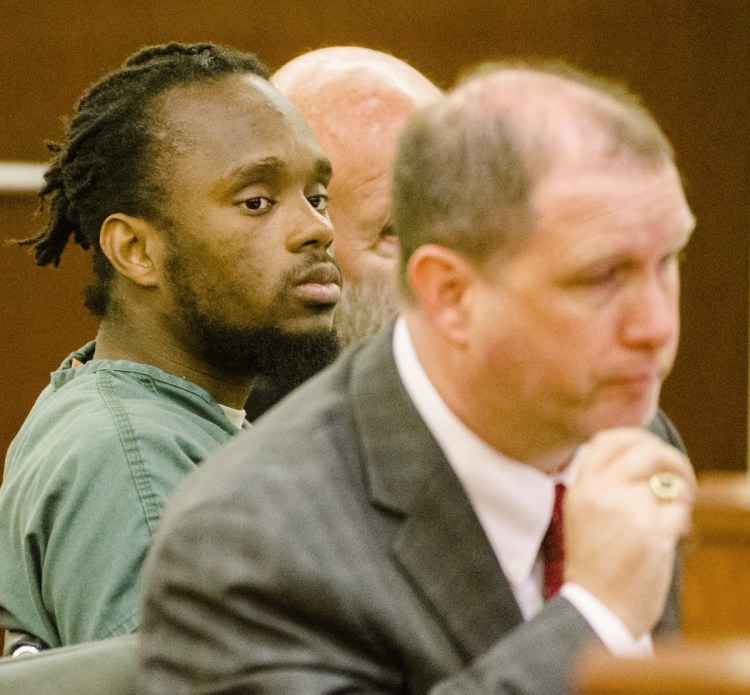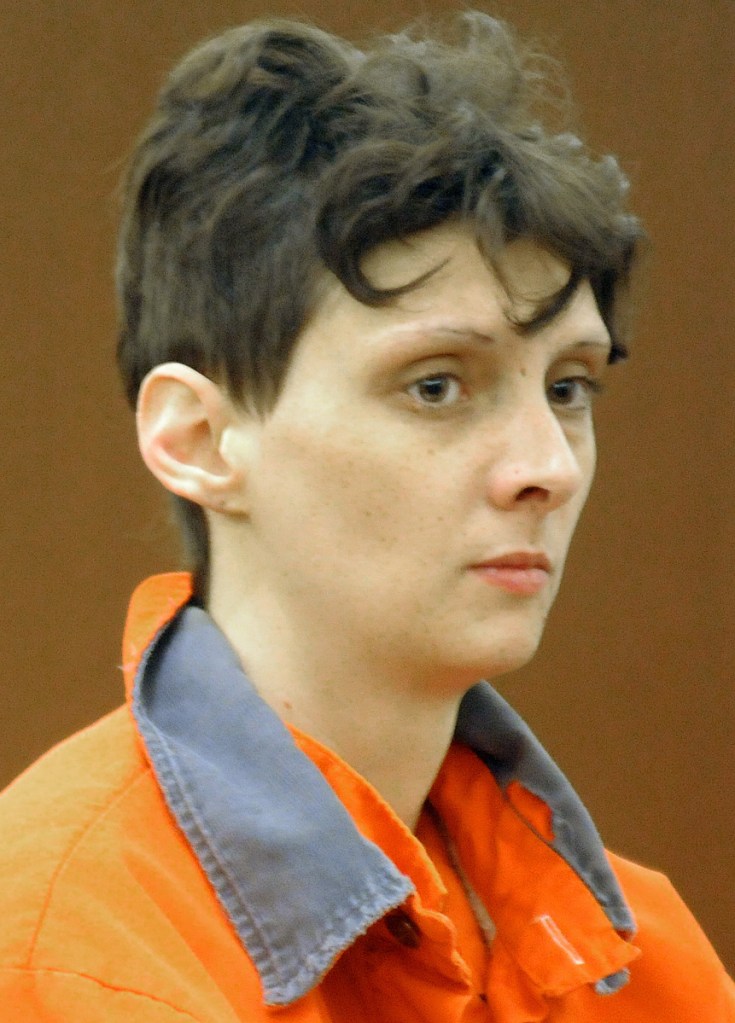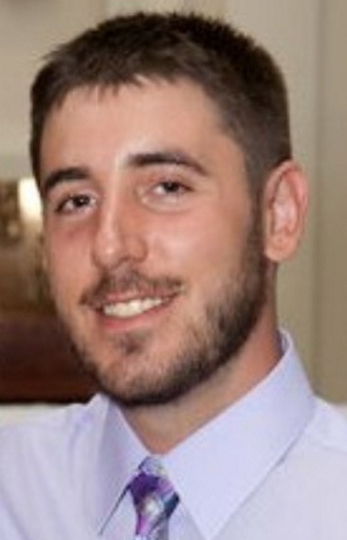AUGUSTA — Aubrey N. Armstrong’s defense attorney maintained Friday that the state has failed to prove beyond a reasonable doubt that his client murdered or robbed Joseph Marceau two and a half years ago.
Attorney Brad Grant suggested that Armstrong wasn’t even there when the killing happened, foreshadowing an argument that someone else is responsible for Marceau’s death.
The remarks from Grant came in his opening statement on the fourth day of Armstrong’s murder trial at the Capital Judicial Center. Closing arguments in the case are expected Tuesday.
Armstrong, 29, of Far Rockaway, New York, is accused of bludgeoning Marceau, 31, of Augusta, to death on Nov. 23, 2015, in a trash-strewn fourth-floor apartment in the city.
Grant had delayed presenting an opening in the nonjury trial, which began Tuesday, but offered a brief one Friday morning, saying witnesses saw co-defendant Zina Fritze, rather than Armstrong, in a hooded sweatshirt at the scene.
Fritze was 27 when she committed suicide by hanging herself in jail a day after pleading not guilty to the murder charges.
Armstrong has pleaded not guilty to all the charges. On Friday, Justice William Stokes, who is not presiding at the trial, came in to advise Armstrong that he has a right to testify at his own trial or to decide against testifying.
“Justice (Daniel) Billings will not hold that against you in any way shape or form. It will be given no consideration by the judge at all,” Stokes said. Grant said Armstrong will make that decision Tuesday, the day the trial resumes.
Grant also sought to have admitted into evidence a videotaped interview of Fritze from Nov. 25, 2015, and one which shows her in the apartment doing a re-enactment of what happened to Marceau. On Friday afternoon, Billings ruled against admitting what he termed “hearsay evidence.”
Grant said in the interview that Fritze “admits setting up a felony drug transaction and said she only allowed her apartment to get used if she got paid.”
Grant also said Fritze’s DNA was found on a back pocket of Marceau’s jeans.
On Thursday afternoon, Christine Waterhouse, a forensic biologist with the Maine State Police Crime Laboratory, testified that she found no DNA belonging to Armstrong on any of the items of clothing tested or any items removed from the crime scene at 75 Washington St., Apartment 8.
One of Armstrong’s co-defendants, Michael Sean McQuade, 47, of Augusta, testified that he saw Armstrong crash a milk bottle over Marceau’s head that night, followed by Damik “Doughboy” Davis, 28, also of New York, striking Marceau with a wooden rocking chair. McQuade, also known as “Dirty,” said Armstrong and Davis beat Marceau to the ground at the entry door. McQuade said Davis stopped at one point and came over to speak to him, but that Armstrong continued, eventually dragging a hog-tied, hollering Marceau into a bedroom at 75 Washington St., Augusta.
That’s where police, who had been called to investigate loud thumping noises, found Marceau’s body shortly afterward. On Friday, Tim Lane, who lives with his family in the apartment below, testified he called police after his light fixture came off the ceiling, a picture fell off the wall and he heard a loud thud like someone hitting the floor. He said the noises and the shaking of the building came about 10 minutes after he heard three people go up the stairs and that he recognized Fritze’s voice as one of them.
McQuade testified that he, Davis and Armstrong had planned to rob Marceau of 5 grams of heroin he had been trying to market for several days and that McQuade and his girlfriend, Fritze, had lured Marceau to their former apartment.
McQuade said the attack on Marceau was a surprise and took place as McQuade and Fritze sifted through their belongings. They had been evicted recently from the apartment.
Armstrong, Davis, McQuade and Fritze were all indicted on charges of murder, felony murder and robbery in Marceau’s death.
Davis and McQuade have pleaded guilty to felony murder and robbery and are awaiting sentencing. Both signed agreements to testify against any co-defendants. Davis, however, was not called as a witness by the prosecution.
On Wednesday, Karen Lea, 42, formerly of Augusta, who was granted immunity by the state, testified that Armstrong, who had street names of “Butter” and “Acon,” had been staying at her 37 Washington St. apartment and using it as a “trap house” to sell drugs that he had brought from his New York home.
She said Marceau had come to her apartment that day, shared “molly” or MDMA with a number of other people there — including McQuade and Fritze — and that Lea herself was drug-sick, trying to get off heroin, and lay on her couch, wanting them to go away.
McQuade testified the robbery plan was concocted there, but Lea testified she heard nothing about it.
However, Lea also said that she awoke to emergency vehicle sirens sounding in the neighborhood later that night and saw Fritze, McQuade and Armstrong entering her home by climbing in through a fire-escape window.
She said Fritze was crying uncontrollably and vomited, that McQuade tried to comfort her, and that Armstrong immediately went into the bathroom with her daughter, put his clothes in the tub and mixed chemicals with them.
Lea also testified that she had been with Armstrong a week earlier at the Vassalboro home of Joseph Gagnon, where another drug dealer, Richard J. Baker, also known as “Stash,” said that Armstrong owed him money for drugs.
Lea said Baker told Armstrong “he had to kill someone, rob someone and one other thing” in order to make up for it.
On Thursday, another witness, Amanda Ware, 31, of Sidney, testified that Armstrong told her he owed “10 grand.”
Ware has pleaded guilty to a federal charge of using/maintaining a drug-involved premises and aiding and abetting in a 20-person drug distribution conspiracy and is in custody awaiting sentencing.
Betty Adams — 621-5631
Twitter: @betadams
Comments are not available on this story.
Send questions/comments to the editors.





